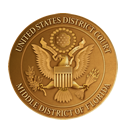
This guide provides information for teachers as to how the essay prompt aligns with the Florida high school curriculum standards and how teachers may promote the essay contest in their classrooms. The Contest Rules explain submission requirements and relevant dates.
We hope you will encourage your students to participate in the 2024 Middle District High School essay contest. Some teachers will qualify for a $500 classroom grant, and the school with the most qualifying entries will receive $1,000. Accordingly, your students may ask for your contact information to include in their online contest Entry Form. In promoting the essay contest to your students, you may want to emphasize the benefits listed below and review with them or direct them to the Contest Home Page, which includes links to the Contest Rules and past winners' essays.
- Cash prizes for the top ten winners.
- Grants for teachers and school.
- Recognition ceremony at the George C. Young Federal Annex Courthouse.
- Opportunity to shadow a federal judge.
- Opportunity to create a writing sample for college and scholarship applications.
- Opportunity to develop research skills and learn more about the the intersection of technology and the First Amendment in public schools.
The essay prompt aligns with several English Language Arts and Social Studies CPALMS and BEST standards: CPALMS SS912.CG.2.1.3; CPALMS SS.912.CG.2.5; CPALMS SS.9.12.C.G.3.2; BEST ELA Standard C.1.2; BEST ELA Standard C.1.3.
The essays will be scored by lawyers and judges in the Orlando Division. Their decisions will be final. The essay graders will evaluate the essays based on the following categories, which directly align with CPALMS and BEST standards as indicated:
- Example of technology impacting education: An above average essay will identify a situation in which technology was mandated or restricted in an educational environment, and how that mandate or restriction impacted the student's First Amendment rights, including the ability to communicate, learn, or express opinions.
- Thesis and Argument Development: An above average essay will convey a competent and well-developed thesis articulating how public school students’ First Amendment rights have been or could be impacted as new technologies emerge, while taking into consideration the special characteristics of the school environment, as identified in Supreme Court precedent.
- Writing Style & Proofreading: An above average essay will contain few to no punctuation, spelling and/or capitalization errors and use precise, topic-appropriate language and vocabulary.
Below is a list of the Supreme Court’s key decisions which may be instructive for you and your students regarding the First Amendment and rights of public-school pupils. Please note that these cases can be challenging for even the most advanced readers. Law students struggle when first reading these cases, and even seasoned attorneys can find that they must read the cases with close focus and attention. Therefore, your students can certainly seek out summaries or descriptions of the cases in order to assist in their understanding of them.
Tinker v. Des Moines Independent Comm. Sch. Dist., 393 U.S. 503 (1969)
Bethel Sch. Dist. No. 403 v. Fraser, 478 U.S. 675 (1986)
Hazelwood Sch. Dist. v. Kuhlmeier, 484 U.S. 260 (1988)
